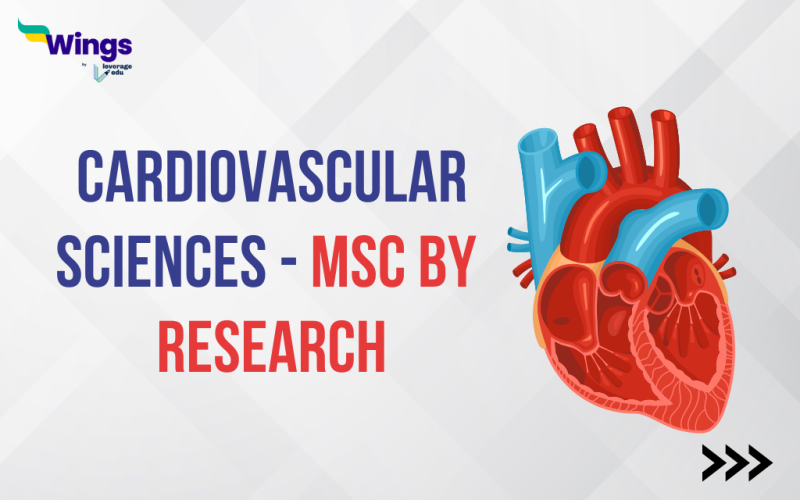Cardiovascular sciences have always been a popular area of research and have captured the attention of medical aspirants. A great percentage of medical students choose cardiology as their field of specialization. A Master of Science (MSc) is the most prominent degree in the field of cardiology which focuses on the study of cardiovascular health and disease. If you wish to know more about masters in cardiology, continue to read this blog.
This Blog Includes:
What are Cardiovascular Sciences?
The study of the function, structure, disorders, and diseases of the vascular system, heart, and blood is known as cardiovascular science. The popular job titles in cardiovascular sciences are perfusionist, invasive cardiovascular technologist, cardiologist, and cardiovascular research scientist.
Top Reasons to Study Cardiovascular Sciences
The following are the top reasons to study masters in cardiology:
- Pursuing this course will allow students to learn more about a wide range of topics such as molecular and cellular cardiovascular sciences, microvascular biology and mechanisms, and laboratory principles
- Students will gain a better understanding of research integrity and valuable research skills regarding the development in the field of cardiovascular sciences
- It will provide students with a great opportunity to work with top researchers and learn more about therapeutic cardiovascular medicine
Top Universities
The following are the top universities to pursue masters in cardiology or cardiovascular sciences:
Eligibility Criteria
The candidate must meet the following criteria to pursue masters in cardiology:
- The candidate must have a bachelor’s degree in science from a recognized university with minimum marks as specified by the university.
- Some universities might ask the applicant to appear for GRE or university-specific exams for this course.
- The candidate will also have to submit scores of English proficiency exams such as IELTS/TOEFL /PTE along with a Statement of Purpose and Letter of Recommendation.
Documents Required
The following are the documents required to apply for masters in cardiology:
- Academic Transcripts
- Proof of English Proficiency
- Copy of passport
- Statement of purpose
- Work Experience (if applicable)
- Proof of Financial Stability
- Reference letter
- Letters of recommendations
- Resume/CV
Application Process
The application process takes place over a period of time and begins months before the commencement of classes. The universities have two main intakes known as the fall intake and winter intake for international students to kickstart their journey. You can call our Leverage Edu experts on 1800 572 000 to find out how the application process can be fast-tracked and streamlined!
Here’s an easy 5-step process to complete your application process to pursue masters in cardiology:
- Call our experts on 1800 572 000 to shortlist your favourite universities and courses. Start your application to multiple universities through our one-dashboard platform
- Compile all your documents like SOPs, essays, certificates and LORs and exam scores like IELTS, TOEFL, GRE, GMAT, etc
- Meet all the application deadlines and start the application process for accommodation, students visa, and scholarships/student loans
- Accept the offer letter and meet your teachers, college mates and roommates virtually
- Get your visa approved and fly to your dream university.
Career Scope
As the concerns regarding heart health and heart diseases continue to surface, medical professionals, are continuing their research in the field of cardiovascular science. Cardiovascular sciences provide abundant opportunities to students in various fields including private hospitals, government hospitals, and healthcare centres and can either choose to open their own clinical practice.
Job Profile and Salary
The following are the popular job profiles in the field of cardiovascular sciences:
| Job Profile | Avg. Salary | In INR |
| Cardiologist | $397,067 | 3.23 Cr |
| Nuclear Biologist | $89,418 | 72.96 Lakh |
| Cardiac Physiologist | $85,709 | 69.93 Lakh |
| Invasive Cardiologist | $289,711 | 2.36 Cr |
| Perfusionist | $148,797 | 1.21 Cr |
FAQs
A. The study of the function, structure, disorders, and diseases of the vascular system, heart, and blood is known as cardiovascular science.
A. Pursuing this course will allow students to learn more about a wide range of topics such as molecular and cellular cardiovascular sciences, microvascular biology and mechanisms, and laboratory principles. Students will gain a better understanding of research integrity and valuable research skills regarding the development in the field of cardiovascular sciences
A. In India, the average salary of a cardiologist is 12 lakh per annum.
Well, we hope that we have provided you with the relevant information on cardiovascular sciences, and if you wish to study at this institution or any other institution abroad, feel free to connect with Leverage Edu for total assistance.


 One app for all your study abroad needs
One app for all your study abroad needs












 60,000+ students trusted us with their dreams. Take the first step today!
60,000+ students trusted us with their dreams. Take the first step today!